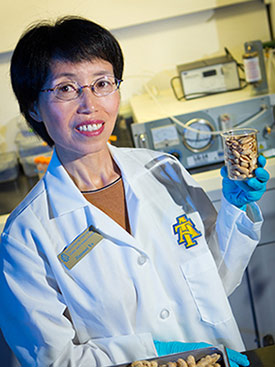N.C. A&T attacks serious health threat with hypoallergenic peanut
With 2.8 million Americans – many of them children – affected by peanut allergies, researchers at N.C. A&T State University have attacked a serious health threat and moved to tap a huge market by developing a hypoallergenic peanut.

A&T announced last year that researchers at its School of Agriculture and Environmental Sciences developed a process to soak shelled, roasted peanuts in enzymes commonly used in food processing. The treatment reduces one key peanut allergen to undetectable levels and another by 98%. Effectiveness was tested in human clinical trials at the University of North Carolina at Chapel Hill.
The procedure does not involve genetic modification to the peanut plant, nor does it involve chemical treatment or irradiation. It uses commonly available food-processing equipment.
And it doesn't affect taste.
The health threat is real: Peanuts cause serious allergic reactions in 0.9% of the U.S. population, or about 2.8 million people. Highly sensitive children and adults can develop anaphylaxis, a severe allergic reaction that can even lead to death, just a few seconds after ingesting minute amounts.
With research dollars from the U.S. Department of Agriculture, the process was developed by Dr. Jianmei Yu, a food and nutrition researcher, and two other A&T researchers who began their work in 2007.
A&T signed an agreement last year with Xemerge, a Toronto-based firm that commercializes food and agriculture technology. They launched Alrgn Bio as a spin-off to license the process; Alrgn has an office in the Gateway University Research Park near A&T.
"This is one of the best technologies in the food and nutrition space we have seen," said Johnny Rodrigues, the chief commercialization officer at Xemerge and founder of Alrgn.
"It checks all the boxes: non-GMO, patented, human clinical data, does not change physical characteristics of the peanut along with maintaining the nutrition and functionality needed, ready for industry integration from processing and manufacturing to consumer products."[1]
The hope, Rodrigues said, is for Alrgn to work with food processors and manufacturers to make the A&T process the industry standard for peanuts, peanut butter and other consumer products with peanut ingredients.[2]
As Allen Johnson, editorial page editor at The News & Record of Greensboro, wrote: “This is more positive proof that N.C. A&T and our other colleges and universities are valued assets (lately, undervalued in legislative funding) that pay back our investments in them several times over.”[3]
[1] http://www.ncat.edu/news/2014/06/peanuts.html
[2] https://aggieresearch.wordpress.com/2014/10/02/n-c-at-xemerge-launch-spin-off-peanut-company-1st-hypoallergenic-peanuts-ready-for-food-industry/
[3] http://www.news-record.com/blogs/thinking_out_loud/at-n-c-a-t-a-new-and-improved-peanut/article_0ded4b16-f0d7-11e3-a683-0017a43b2370.html
N.C. A&T is a partner of The North Carolina Translational and Clinical Sciences (NC TraCS) Institute. Learn more at ncat.edu.
Originally post at higheredworksfoundation.org/blog
- Created on .